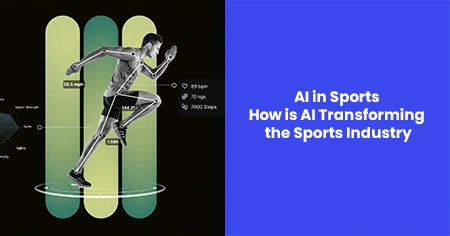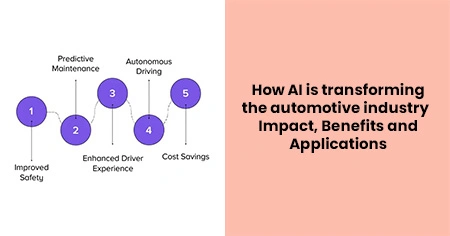AI is transforming the sports sector in numerous ways. It increases the training process's competitiveness and efficiency. It is also used to analyze and forecast athletic performance.
AI is transforming the sports sector in numerous ways. It increases the training process's competitiveness and efficiency. It is also used to analyze and forecast athletic performance.
Its reach and impact have spread to regions previously deemed untouchable by robotics and sophisticated algorithms. Among these, the realm of sports is an incredibly stunning example of AI's transformative power. The sports sector, noted for its dynamic character and emphasis on human skill and spontaneity, is now at the forefront of an AI-driven transformation. AI's impact on sports is far-reaching, ranging from improving player performance to changing fan engagement. In this article, we will discuss AI in sports and how AI transforming the sports industry.
The following stats say that:
- The global artificial intelligence sports market was valued at $1.8 billion in 2021 and is expected to grow to $19.9 billion by 2030, with a CAGR of 30.4%.
- The sports business is rapidly adopting AI, with market predictions showing significant expansion. By 2032, the worldwide AI sports analytics industry is estimated to be worth $29.7 billion, with the AI sports market worth $19.9 billion.
- Advances in AI technologies, increased investments by sports organizations, and a growing demand for data-driven insights are driving this expansion.
- AI's importance in sports is growing due to its capacity to provide detailed insights into player performance, opponent analysis, injury prevention, and strategic decision-making.
- AI revolutionizes how teams and leagues function in sports, providing a competitive advantage through advanced data.
- These market predictions show increased acceptance and usage of AI technologies in sports. As the sector adopts a more data-centric approach, AI's role becomes increasingly important, opening the way for innovative and efficient sports management and strategy.
AI in the Sports Industry

AI in the sports sector drives innovation and revolution, revealing new possibilities for how games are played, administered, and enjoyed. Its ability to analyze complicated data and provide real-time insights is ushering in a new sporting performance and fan participation era. The power of artificial intelligence is setting new standards across the board.
Application of AI in Sports
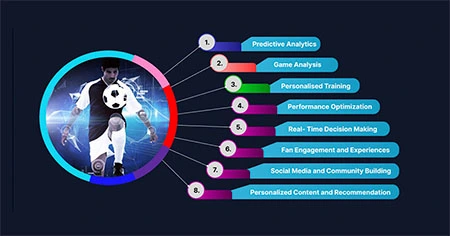
AI has multiple uses in sports, from performance analysis to fan engagement.
Performance analysis
Performance analysis is one of the most well-known AI applications in sports. AI systems monitor player performance in real-time, offering information about strengths and flaws. Coaches use this information to customize training programs, enhancing performance and lowering injury risks.
Scouting & recruitment
AI is also changing the scouting and recruitment processes in sports. By evaluating massive databases of player statistics, video footage, and other pertinent data, AI systems may find talented athletes more accurately and efficiently than traditional scouting methods.
These AI-powered scouting tools can discover minor patterns and variations in player performance that human scouts may ignore, helping teams identify the next generation of superstars.
This enhances the quality of talent acquisition and simplifies the recruitment process, saving teams time and resources.
Game strategy and tactics
AI helps establish game plans and tactics. By assessing competitors' previous performances, AI can provide the optimal strategies.
This data-driven strategy gives teams a competitive advantage by allowing them to make more informed decisions during games.
Fan engagement
Artificial intelligence is redefining fan engagement. Personalized content, interactive experiences, and AI-powered chatbots improve the fan experience.
Real-time updates, personalized recommendations, and interactive content keep fans interested and connected to their favourite teams and players.
Broadcasting and media
Artificial intelligence is changing sports broadcasting and media. Some examples include automated highlights, better-watching experiences, and AI-powered commentary.
AI generates highlights by studying game footage, saving fans time and providing them with quick access to the best moments.
Officiating and fairness
Officiating must be fair and accurate for any sport to maintain its integrity. AI is making a substantial contribution in this field, with systems that can analyze video footage and sensor data in real-time to help referees and umpires make more educated and consistent decisions.
For example, the FIFA World Cup in Qatar 2022 used an AI-powered system to analyze player positioning and ball movement, providing referees with real-time input on potential offsides or other rule breaches. This technology can eliminate human mistakes and controversy, making sports more equitable and pleasant for players and spectators.
Business and operations
Artificial intelligence helps commercial processes in the sports industry. Predictive analytics helps with ticket sales and marketing tactics.
AI-driven optimization and security measures improve venue management, ensuring that sporting events run smoothly and efficiently.
Automated sports journalism
AI is also changing the landscape of sports writing with automated systems that can write game summaries, player statistics, and other content based on live data. These AI-powered platforms enable journalists to focus on in-depth analysis and narrative while delivering timely and reliable information to fans.
AI Frameworks for Sports
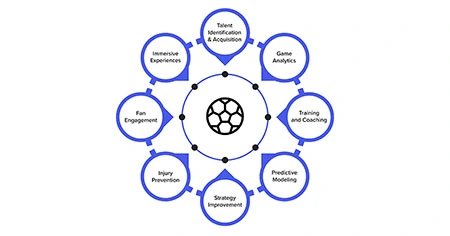
AI frameworks form the foundation for deploying AI technology in sports.
These frameworks include machine learning, deep learning, and neural networks, which handle massive volumes of data to produce significant insights.
Machine learning
Machine learning algorithms are important in sports. They use historical data to find trends and make forecasts. This helps with performance analysis, game strategy building, and injury avoidance.
For example, machine learning may examine player performance data to forecast future results, allowing coaches to make more informed judgments.
Deep learning
Deep learning, a form of machine learning, uses neural networks to replicate human brain operations. It is especially handy for picture and video analysis, tracking real-time player movements.
This technology is critical for performance analysis, allowing coaches and analysts to analyze player behaviour better and optimize training regimens.
Neural networks
Neural networks are an important part of AI in sports. They use complex data sets like player motions and game footage to provide insights.
This technology helps with performance analysis, injury prevention, and game strategy formulation. Using biomechanics, neural networks may identify potential injury risks, ensuring player health and longevity.
Deep learning, a form of machine learning, uses neural networks to replicate human brain operations. It is especially handy for picture and video analysis, tracking real-time player movements.
AI in injury prevention

Injury prevention is a major topic in sports. AI frameworks use biomechanical data to predict potential injury hazards.
Understanding the elements contributing to injuries allows teams to apply preventive measures, lowering the risk of injury and extending players' careers.
The Future of AI in Sports
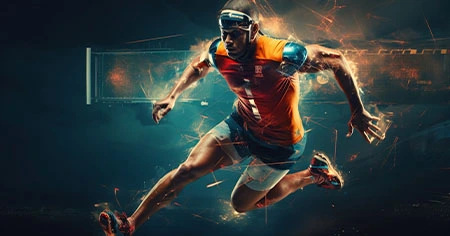
As the sports sector continues to embrace the power of artificial intelligence, we can anticipate even more inventive applications and dramatic advances in the years ahead. From individualized training and injury prevention to immersive fan experiences and automated officiating, AI's promise in sports is virtually unlimited
By using data, machine learning, and advanced analytics, sports businesses may gain a competitive edge, improve the fan experience, and push the boundaries of what's possible in sports.
As we look ahead, incorporating AI into sports will be a crucial driver of innovation and success in this dynamic and ever-changing sector.
SoftCircles, a web design agency, can help startups harness AI for technical needs, digital engineering, and design thinking. SoftCircles offers innovative solutions that combine technology, user experience, and design to help organizations reach their full potential and thrive in the future.




